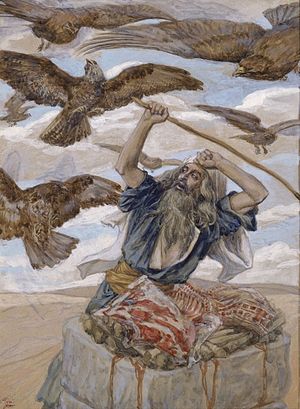And He said to him, "I am the Lord who brought you out from Ur of the Chaldeans to give you this land to possess." But he said, "O Lord God, how am I to know that I shall possess it?" He said to him, "bring me a heifer three years old, a female goat three years old, a ram three years old, a turtle dove and a young pigeon." And he brought Him all these, cut them in half, and laid each half over against the other. But he did not cut the birds in half. and when the birds of prey came down on the carcasses, abram drove them away.
As the sun was going down, a deep sleep fell on Abram. and behold, dreadful and great darkness fell upon him. Then the Lord said to Abram, "Know for certain that your offspring will be sojourners in a land that is not theirs and will be servants there, and they will be afflicted 400 years. But I will bring judgement on the nation that they serve, and afterward they shall come out with great possessions. As for yourself, you shall go to your fathers in peace; you shall be buried in a good old age. And they shall come back here in the fourth generation, for the iniquity of the Amorites is not yet complete."
When the sun had gone down and it was dark, behold, a smoking fire pot and a flaming torch passed between these pieces. On that day the Lord made a covenant with Abram, saying, "To your offspring I give this land, from the river of Egypt to the great river, the river Euphrates, the land of the Kenites, the Kenizzites, the Kadmonites, the Hittites, the Perizzites, the Rephaim, the Amorites, the Canaanites, the Girgashites and the Jebusites."
Abram is questioning God on how the promise of this land will come about and is, at this point ,probably frustrated and concerned with the details. God's response is for Abram to bring Him sacrificial animals. It is a response possibly unique to the time and the location, and resembling that of a blood pact. God does not seem angered or displeased with Abram's questions, but instead reassures him through ceremony and a dream. In ancient times, the splitting in half of an animal would be followed by the two parties of this covenant pact walking between the halves. This is to confirm that a promise has been made and that both parties will uphold their end. The braking of such a pact will end in the death of the offending party; it is like saying, as they are so shall I be, I swear on my life. That said, it does not appear that Abram ever walks between the halves. He instead, falls to sleep, and God alone will keep the promise so the symbolic passing of the pot and the torch.
"And I will give the men who have transgressed My covenant, who have not performed the words of the which they made before Me, when they cut the calf in two and passed between the parts of it. "Jeremiah 34:18 NKJV
Some have said that the animals chosen for this sacrifice are reflective of the sacrificial guidelines that will later be given to Moses in Leviticus. Abram is told what to bring but not how to prepare it, so it would appear that he is already well versed in sacrifice. After 400 years of captivity I believe the practices of the Hebrew will have to be retaught to a people that have not yet been established as a nation. There is however more symbolism here than I am prepared to speculate upon, but I would like to leave the reader with the list of the animals again and scriptures that correspond to each type.
The ram which you saw, having the two horns - they are the kings of Media and Persia. And the male goat is the kingdom of Greece. Daniel 8:20&21
Heifer: "Because you were glad, because you rejoiced, you destroyers of my heritage, because you have grown fat like a heifer threshing grain, and you bellow like bulls." Jeremiah 50:11 NKJV
Dove: It is left whole in this sacrifice. We have recently seen the dove as a symbol of God's peace with man after the flood and the mark of his ability to exit the ark.
When He had been baptized, Jesus came up immediately from the water; and behold, the heavens were opened to Him, and He saw the Spirit of God descending like a dove and alighting upon Him. And suddenly a voice came from heaven, saying, "This is my beloved Son, in whom I am well pleased." Matthew 3:16 NKJV
We are also directed to be wise as serpents yet harmless as doves.
Pigeon: I have seen some Hebrew translators refer to it in this passage as a young eagle, or the word could be translated "to cheep", as in the noise that young birds make. Possibly a young pigeon or dove as pigeons are a type of dove. The pigeon, like the dove, is used as a symbol of peace. There's a lot in this passage so if you have input or care to discuss then please comment.











0 comments:
Post a Comment
Note: Only a member of this blog may post a comment.